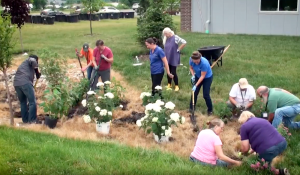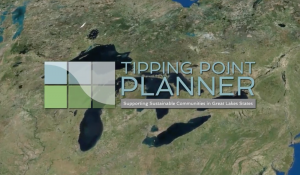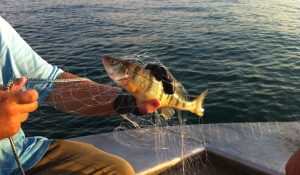
Interested in exploring the Great Lakes even though you’re stuck at home? With the global pandemic causing lockdowns and travel restrictions in many states, Illinois-Indiana Sea Grant (IISG) specialists are moving their usual in-person outreach events to the virtual world. Through live video streaming, IISG scientists will share their expertise on a multitude of topics. As a partner in Michigan Sea Grant’s H.O.M.E.S. at Home series (named after the five Great Lakes: Huron, Ontario, Michigan, Erie, and Superior), our webinars will be focused on learning more about Great Lakes topics, but many will be general enough that learners across the nation can discover fun facts about their natural environments.
If you miss the livestream lessons, no need to worry. Our H.O.M.E.S. at Home educational content will be archived on the IISG YouTube channel. For more educational resources, visit our Learning at Home page. Below are our upcoming, free webinars.
Rainscaping and Rain Gardens
Friday, May 1 – 9:30 a.m. ET / 8:30 a.m. CT

The webinar will introduce participants to rainscaping and will specifically focus on an overview of rain garden benefits, siting, sizing, design, installation and maintenance considerations. This program is a very short introduction to the information shared during the 2 day, 15 hour Rainscaping Education Program workshops.
Presenters: Kara Salazar and John Orick
Join Webinar Watch on Facebook Live
Community Planning with Tipping Point Planner
Tuesday, May 5 – 10:30 a.m. ET / 9:30 a.m. CT
 The webinar will introduce participants to the free, online decision support tool features available in Tipping Point Planner for all Great Lakes states. The tools are resources for regional, county and municipal land use planning that focus on identifying natural resource issues and prioritizing critical areas. Tool topics address nutrient loading from agricultural and urban landscapes, land use changes and stream health.
The webinar will introduce participants to the free, online decision support tool features available in Tipping Point Planner for all Great Lakes states. The tools are resources for regional, county and municipal land use planning that focus on identifying natural resource issues and prioritizing critical areas. Tool topics address nutrient loading from agricultural and urban landscapes, land use changes and stream health.
Presenters: Kara Salazar, Dan Walker, and Lydia Utley
Join Webinar Watch on Facebook Live
Hot and Cold: How do warm summers and icy winters affect fish?
Thursday, May 7 – 10:30 a.m. ET / 9:30 a.m. CT
 Do you live in a temperate climate with warm summers and cold winters? Have you noticed how lakes and ponds freeze over in the winter but get as warm as bath water in the summer? In this webinar, you’ll learn about the unique annual physical changes that happen to water in your local lakes and ponds. The physical properties of water allow aquatic organisms to survive long, cold winters under thick ice as well as hot summers with warm water temperatures. Temperature can create barriers within ponds and lakes that can be tough for its inhabitants to cross. These annual changes can influence the location of oxygen and food for fish and other aquatic organisms as well as impact our experiences when we swim at the beach.
Do you live in a temperate climate with warm summers and cold winters? Have you noticed how lakes and ponds freeze over in the winter but get as warm as bath water in the summer? In this webinar, you’ll learn about the unique annual physical changes that happen to water in your local lakes and ponds. The physical properties of water allow aquatic organisms to survive long, cold winters under thick ice as well as hot summers with warm water temperatures. Temperature can create barriers within ponds and lakes that can be tough for its inhabitants to cross. These annual changes can influence the location of oxygen and food for fish and other aquatic organisms as well as impact our experiences when we swim at the beach.
Presenter: Jay Beugly
Join Webinar Watch on Facebook Live
Illinois-Indiana Sea Grant is a part of University of Illinois Extension and Purdue Extension.
Writer: Hope Charters

